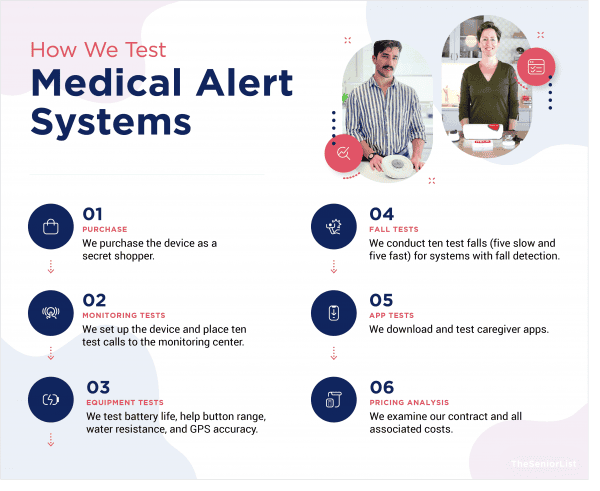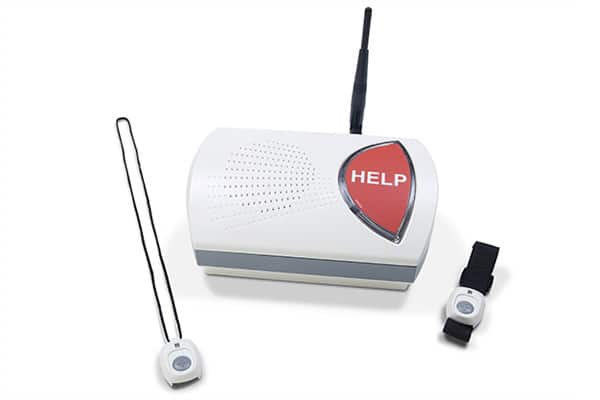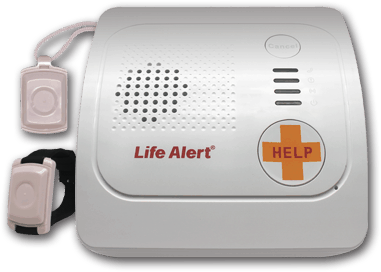Life Alert vs. Medical Alert Comparison
For older adults and those with mobility challenges, a reliable medical alert system can be the difference between independence and constant supervision. While Life Alert has built significant brand recognition through decades of television commercials, Medical Alert has emerged as a compelling alternative with advanced features and competitive pricing.
In this comprehensive comparison of Life Alert and Medical Alert systems, we have taken into account multiple criteria, including response times, pricing, features, and contract terms. Our team found that Life Alert offers reliable equipment backed by years of industry experience. However, Medical Alert provides faster response times, modern features such as fall detection, and, significantly, more affordable pricing without long-term contracts.
Key Findings
- In emergency response time tests, Medical Alert proved significantly faster than Life Alert, with an average connection time of 28 seconds, compared to Life Alert’s lengthier 120-second average.
- Medical Alert offers more affordable pricing starting at $27.95 monthly, while Life Alert’s base price is nearly double that at $49.95 per month. Plus, Life Alert requires customers to commit to a minimum three-year contract.
- Medical Alert provides the option for fall detection technology in their systems, a potentially life-saving feature that’s not available with Life Alert devices.

Why Trust TheSeniorList.com?
At TheSeniorList.com, our team of caregivers, experts, and health care professionals conducted over 5,000 hours of in-depth research and testing to recommend the most reliable brands and devices. In this process, our team:
- Tested 50 medical alert devices from 15 different brands.
- Surveyed 1,250 seniors and caregivers on medical alert system usage.
- Consulted with nurses, EMTs, and caregivers who are experts at caring for older adults.
- Published dozens of videos that demonstrate our medical alert system testing.
- Evaluated verified customer reviews of medical alert companies from the Better Business Bureau.
How We Test Medical Alert Systems

Most medical alert companies sell a variety of systems, including in-home systems, mobile systems, and smartwatches. Each device has its own specific features, but they all offer the same basic function: connecting a user to help in an emergency. With this in mind, we evaluate every medical alert system on the following criteria:
- Response times: The faster a medical alert system connects you to help, the better. For each system, we performed 10 test calls, counted how long it took to receive a response, and calculated an average.
- Ease of use: In an emergency, it’s important that a user can successfully activate their system. So we carefully evaluated each device’s design — with simplicity at the forefront.
- Customer care: A human touch is key to caregiving. With this in mind, medical alert companies must offer impeccable customer service — from the agents at their monitoring centers to their support personnel.
- Pricing and contracts: We analyze device costs, subscription costs, contract requirements, and other fees associated with a medical alert system purchase.
- Extra features: We test out voice commands, caregiver apps, fall detection, activity monitoring, and any other features included with a medical alert system.
Pro Tip: Which medical alert company comes out on top? To learn more, check out our pick for this year’s best medical alert system.

|

|
|
|---|---|---|
| Editor's Ratings | ||
| Starting Price (Home System) | $49.95 per month | $27.95 per month |
| Starting Price (Mobile System) | $69.95 per month* | $42.95 per month |
| Minimum Contract Requirement | 3 years | 1 month |
| Average Response Times | 120 seconds | 28 seconds |
| Fall Detection | Not available | $10 per month |
| Caregiver App | Not available | Included |
| Smartwatch Option | Not available | Yes |
| Contact | ||
| Phone Number |
Call for best price:
(855) 583-3364 |
|
| Website | View Packages Links to Medical Alert |
*Life Alert’s GPS help button costs $20 per month, but it must be purchased in addition to the home system, totaling $69.95 monthly.
Medical Alert Systems Overview
Medical Alert stands out as one of our favorite personal emergency response systems, combining affordability with high-quality service. The company’s monitoring performance and straightforward device options, including reliable fall detection without reinventing the wheel, make it a solid choice for most users.
Their product lineup includes both home-based and mobile systems. For home systems, the company offers landline and cellular options. For mobile systems, the company offers a standard mobile system, a mini mobile system, and a medical alert watch.
Testing revealed impressive response times from their monitoring center, with agents responding within 16 seconds on average. The monitoring staff demonstrated both professionalism and helpfulness during these interactions.

Medical Alert Devices Compared
| System | Monthly Cost | For Use | Additional Features |
|---|---|---|---|
| Home System |
|
At Home |
|
| Mobile System | $42.95 | At home and on the go |
|
| Mini Mobile System | $47.95 | At home and on the go |
|
| Smartwatch | $39.95 | At home and on the go |
|
Life Alert Systems Overview
During our direct testing and evaluation of Life Alert, we found their product naming system somewhat confusing compared to that of their competitors. For instance, their home system appeared under different names. We saw it called the “Micro Voice Pendant System” in marketing materials, but our actual contract labeled it as the “Master Unit.”
Regardless, Life Alert’s product line consists of three systems: a home system, a mobile unit, and a wall-mounted help button. However, unlike Medical Alert, which allows you to purchase any of their systems as a standalone device, Life Alert customers must purchase the home system ($49.95 monthly) before adding either the mobile system or wall-mounted button. This makes the advertised $20 monthly fee somewhat misleading, as that price only applies to add-on device costs after purchasing the required base system.
If you’re interested in our complete testing experience, you can find more details in our comprehensive Life Alert system review. To learn more about Life Alert’s costs and contracts, be sure to check out my guide to Life Alert costs.

Life Alert Devices
| System | Monthly Starting Cost | For Use | Additional Features |
|---|---|---|---|
| Home System | $49.95 | At home |
|
| GPS Help Button | $20* | At home and on the go |
|
| Wall-Mounted Help Button | $20* | At home |
|
*These devices are add-ons and must be purchased in addition to the Life Alert Master Unit.
Costs and Contracts
The most significant difference between Life Alert and Medical Alert is their costs and contracts. For starters, Medical Alert systems are easily more affordable in terms of monthly payments. Their most affordable system (the home landline system) costs $27.95 per month, and their mobile systems start at $39.95 per month. Even if you add on fall detection to either system — an extra $10 per month — you’ll still pay less than you would for a Life Alert system.
On top of this, you’re locked into a three-year contract with Life Alert. While you’ll still pay on a monthly basis, you’ll be locked in for the next three years. The only way to get out of your contract is if a user passes away or transitions to a care facility.
Did You Know: Of all the medical alert systems we’ve tested, Life Alert is the only one that requires you to sign a long-term contract. Most companies, including Medical Alert, will give you a discount for paying for a year of service in advance; however, they don’t require this commitment.
Medical Alert, however, does not require a long-term contract when you purchase one of their systems. You pay on a month-to-month basis, and you can cancel your service and return your equipment at any time. Additionally, if you pay for your Medical Alert subscription on an annual or semi-annual basis, you’ll get a discount on the overall cost. For example, the home landline system costs $27.95 per month when you pay month-to-month, but it will cost $239.40 — or $19.95 per month — if you pay for an entire year in advance.
Performance
Performance testing revealed a stark disparity between Life Alert and Medical Alert systems. Despite being among the most expensive options in the market, Life Alert demonstrated concerning response times. It took an average of 120 seconds to connect with monitoring personnel – the slowest performance observed in comparative testing. While Life Alert’s agents exhibited professionalism and courtesy once connected, and the audio quality remained clear, the extended wait times for emergency assistance are alarming.
By comparison, Medical Alert delivered substantially better performance. Their systems connected us to help in an average of 28 seconds on both home and mobile units. The mobile system impressed us with its location tracking capabilities, providing monitoring agents with precise location data down to the cross streets.
The considerable difference in response times between these two services has significant implications for user safety. Despite Life Alert’s adequate audio quality and professional staff, Medical Alert’s superior response speed and accurate location services make it the more reliable choice for emergency response needs.
Did You Know: While medical alert systems appear to offer similar functionality as cell phones, one study found medical alert systems can improve quality of life and decrease the length of stay in emergency departments among elderly users.
Extra Features
A notable limitation of Life Alert’s product lineup is the absence of automatic fall detection capabilities. While fall detection technology isn’t 100 percent accurate, it provides an important safety feature by automatically detecting most falls and alerting monitoring personnel who can evaluate the emergency.
Medical Alert, on the other hand, incorporates fall detection technology as an optional feature across their entire product range. Although this adds $10 to the monthly service cost, the potential life-saving benefits make it a valuable option, particularly for individuals with mobility challenges. In our tests, Medical Alert’s fall detection was able to detect a majority of our simulated falls.
In addition, Medical Alert also offers an app for caregivers. While not as advanced as Bay Alarm Medical’s app, it does reassure loved ones that a system is on and properly connected, and it’s also handy for managing emergency contacts.
Life Alert, on the other hand, does not offer a caregiver app.
FYI: Seniors are most likely to fall in the bedroom, in the bathroom, or on the stairs, which is why we often recommend placing wall-mounted buttons in and around these locations.

Our Top Choice
Normally, this is the portion of the article where we note the various pros and cons of each company’s medical alert systems, ultimately recommending a different brand for each individual type of user. However, Life Alert is impossible to recommend for anyone.
Medical Alert demonstrates superior value and performance over Life Alert. Medical Alert’s systems deliver better protection both inside and outside the home, all for significantly lower costs. These advantages in both performance and pricing establish Medical Alert as a leading alternative to Life Alert.
If you want to learn more about other affordable medical alert devices, read our full guide to budget-friendly medical alert systems.
Frequently Asked Questions
-
Which is better: Life Alert or Medical Alert?
While both medical alert companies offer quality equipment, Medical Alert’s devices will cost you far less than those of Life Alert. Additionally, in our tests, they gave us much faster access to help.
-
Does Life Alert have fall detection?
Life Alert does not support automatic fall detection. To contact response agents with a Life Alert system, a user must press the help button.
-
Can I cancel my service if I'm not satisfied?
With Medical Alert, you can cancel your service at any time, return the equipment, and receive a prorated refund, as they operate on a month-to-month basis. Life Alert requires a three-year contract that can only be terminated if the user passes away or moves to a care facility.
-
What types of devices do Medical Alert and Life Alert offer?
Both companies offer in-home systems with cellular and landline connections. Additionally, both companies offer a mobile device with GPS capabilities. Medical Alert, however, offers a medical alert smartwatch, while Life Alert’s only other system is a wall-mounted help button.
